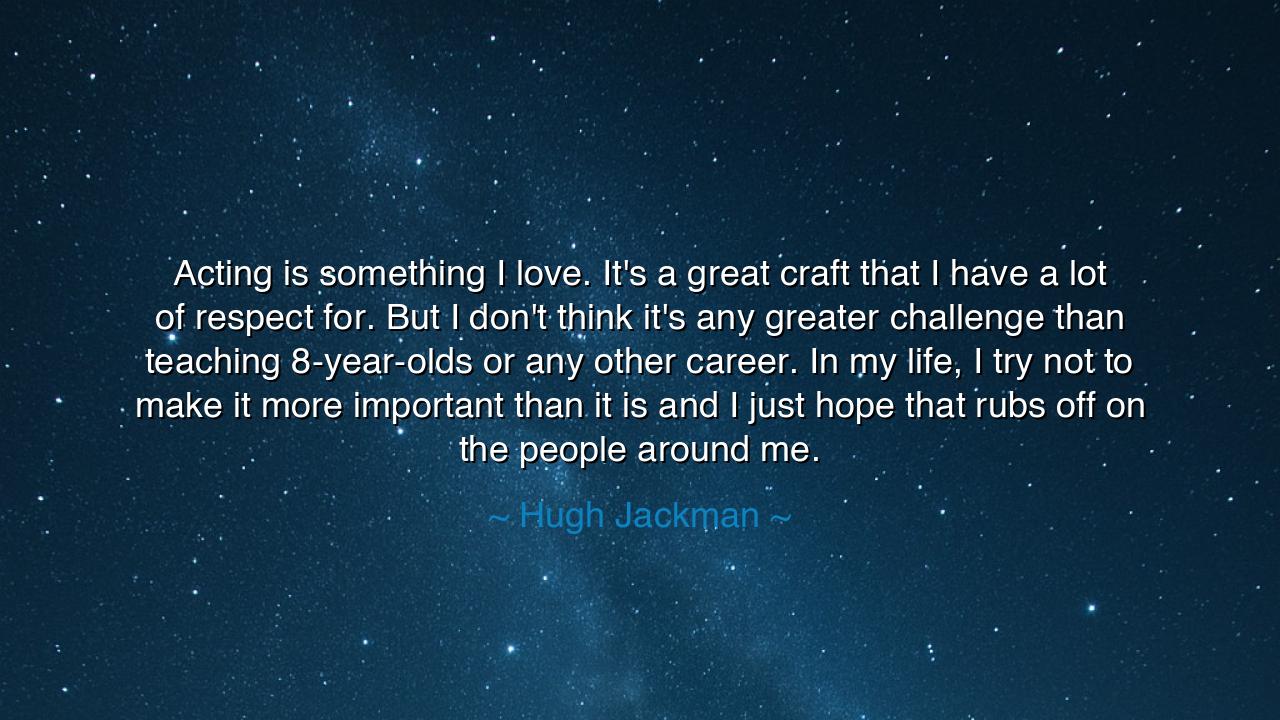
Acting is something I love. It's a great craft that I have a lot
Acting is something I love. It's a great craft that I have a lot of respect for. But I don't think it's any greater challenge than teaching 8-year-olds or any other career. In my life, I try not to make it more important than it is and I just hope that rubs off on the people around me.






The words of Hugh Jackman, spoken with humility and grace, echo an ancient truth: “Acting is something I love. It's a great craft that I have a lot of respect for. But I don't think it's any greater challenge than teaching 8-year-olds or any other career. In my life, I try not to make it more important than it is and I just hope that rubs off on the people around me.” In these words, there is no vanity, no boast of fame or talent—only balance, reverence, and perspective. He reminds us that no matter how high one may climb, the ground beneath all of us is made of the same earth. His words are a song to humility, a lesson in respect for all vocations, and a call to live with equanimity amidst the storms of recognition and pride.
To the ancients, humility was the highest virtue of the strong. The great king who forgot he was a servant of his people soon became a tyrant, while the wise ruler who remembered his shared humanity became a blessing to his realm. Hugh Jackman, a man celebrated across the world for his performances, speaks not as one elevated above others, but as one who sees clearly that greatness is not measured by fame or skill, but by sincerity. Whether one stands upon a stage before thousands or in a classroom before ten, the true challenge lies not in the audience but in the heart.
In calling acting a “great craft,” Jackman honors the art itself—its discipline, its vulnerability, its demand for truth. But he refuses to place it above other labors, for he knows that every calling, if done with love, holds equal worth. To teach children, to heal the sick, to till the soil, to raise a family—these are all sacred forms of creation. The world errs when it ranks one over the other. The actor and the teacher both perform a miracle: one opens minds through story, the other through understanding. Both touch the spirit, and both require devotion and patience.
Consider the life of Marcus Aurelius, the Roman emperor who ruled the mightiest empire of his age yet wrote humbly in his journal, “Soon you will have forgotten all things, and all will have forgotten you.” Though he held power over nations, he saw himself as no greater than the farmer who worked the land or the soldier who stood guard in the cold. His greatness lay in the restraint of his ego, in his refusal to believe his crown made him divine. Hugh Jackman follows this same path—not by rejecting success, but by grounding it in gratitude. In a world drunk on applause, his clarity is a rare and noble strength.
His words also reveal a truth about balance—the wisdom of knowing one’s place in the tapestry of life. When he says, “I try not to make it more important than it is,” he reminds us that passion, when untethered from humility, becomes pride. To love one’s craft deeply is beautiful; to worship it blindly is dangerous. The true master loves his art yet remains its student. He walks with reverence, but also with laughter. He knows that the moment he believes himself greater than others, the spirit of the craft will abandon him.
Hugh Jackman’s humility also carries a quiet strength: the wish that his groundedness “rubs off on the people around” him. This is how the wise lead—not by command, but by example. The light of a humble heart does not boast; it simply shines, and others are warmed by it. The actor who treats his crew with kindness, the teacher who respects her students, the leader who listens rather than boasts—these are the true artists of living. Their example becomes a gentle revolution, showing that greatness needs no crown, no title, no spotlight.
Lesson and Practice:
Hold your passion with reverence, but never with pride. Whatever your craft—be it teaching, building, healing, creating—do it with the same love and respect that you would give a sacred art. Do not measure your worth by applause or recognition, for the truest success is quiet and enduring. When you rise, lift others beside you; when you shine, let others share in your light. In this way, your work becomes not an idol, but a service—a way to bring balance and grace into the world. For as Hugh Jackman teaches through both word and deed, humility is not the lowering of oneself—it is the elevation of all.






AAdministratorAdministrator
Welcome, honored guests. Please leave a comment, we will respond soon